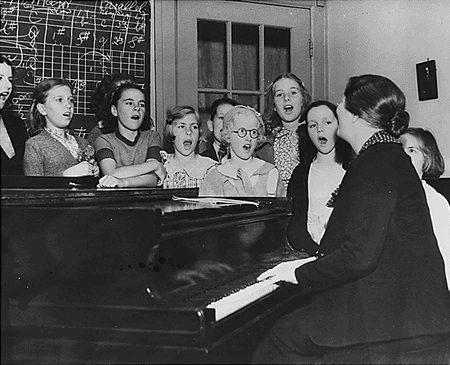I have had singing
I love recorded music. It’s incredible to live in an era and place where you can listen to so much great music as often as you want. However, I also kind of blame recorded music for ruining singing.
Now, by a certain standard, singing might be arguably doing better than ever. We have the opportunity to listen to the best of the best voices through recorded music. And every great singer goes on to inspire more people to pursue singing, leading to more and more great singers.
The problem here is that singing is almost exclusively conceived in the popular consciousness as something performed. Certainly singing as a performance is doing better than ever, but what we’ve lost is singing as something people just do. The majority of people’s interactions with singing are now as listeners to a performance, usually through a recorded medium. I think this has cemented the idea that singing is essentially a performance, that is, something not worth doing if you can’t do it “well”.
Many people almost never sing now. Some may sing only at karaoke. Many attend regular religious services where there is singing, but even here, the singing may be non-participatory, or they may not participate even when invited to. Plenty of people (at least where I live) will not even sing in these circumstances, claiming that they simply “can’t sing”.

We need more space in our culture for people to simply sing without performing. We can sing at sporting events (we still do, a little) or while we work. Let’s sing more drinking songs in bars, more lullabies to our children, more senseless tunes in the shower. Let the average quality of singing go down and the total amount of singing done go up.
In my college choir, we sang the song I Have Had Singing by Ron Jeffers. My director would end our Spring tour concerts with this song, encouraging the audience to bring more singing into their daily life. The song is based on the words of an old English ploughman remembering the singing he had in his own daily life:
In his book Akenfield, Portrait of an English Village, Ronald Blythe records the life stories of the inhabitants of a tiny (population 298) East Anglian village in Suffolk County, England. The names of the village and villagers have been changed, but the harshness, isolation, and beauty of their lives shine through their memories and observations. 74-year-old “Davie” remembers that “twenty men and boys scythed the corn and sang as they went.” “What was the song?” Blythe asks. “Never mind the song—it was the singing that counted” came the reply. “Fred Mitchell,” an 85-year-old horseman (ploughman), recalls his difficult childhood:“I never did any playing in all my life. There was nothing in my childhood, only work. I never had pleasure. One day a year I went to Felixstowe along with the chapel women and children, and that was my pleasure. But I have forgotten one thing—the singing. There was such a lot of singing in the villages then, and this was my pleasure, too. Boys sang in the fields, and at night we all met at the Forge and sang. The chapels were full of singing. When the first war came, it was singing, singing all the time. So I lie; I have had pleasure. I have had singing.”
Do you think recorded music has affected how much we sing?
Do you sing in your daily life?
Do you wish you sang more?
Let me know your thoughts at my Ctrl-C email: gome @ ctrl-c.club.
* I have heard frustratingly many people claim they are “tone deaf”. It’s one thing to struggle matching a pitch, but very few people have genuine musical processing impairments. And even those who are truly amusical can still sing, even if it’s tuneless. In general, if you can speak, you can sing.